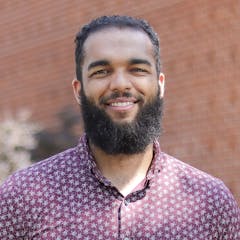The Healing Power of Forgiven Sin

His body didn’t work.
How long had he been known as “the paralytic”? How long had his legs not obeyed? How long would he be held a prisoner in his own bed?
But the word on the street was that the Messiah was coming. When the paralytic heard of it, he couldn’t help the impulse to do what he had been scared to do for some time: hope.
Story after story testified that Jesus could heal him. He could raise a cripple from his bed, he could resurrect fallen limbs — but would he? These legs? Forsaking caution, the paralytic enlisted his friends to carry him to his only hope.
The house was full. They couldn’t get through the door — but going home was not an option. They climbed to the roof, bore through the ceiling, and his friends lowered him down through the roof. Though many pressed in on the miracle-worker, Jesus, delighting in their faith, called out to the paralytic, “Take heart, my son . . . ”
As the Messiah began to speak, rain began to fall upon the desert; the sun was cresting the horizon; hope, his estranged friend, drew near again. Unknown to even his closest of friends, the years had worn on him. His spirit lay nearly as limp as his legs. But Jesus commanded him to take heart. He knew. In the crowded room, the Messiah himself called him “my son.” Certainly, the healing was about to come.
“Take heart, my son; your sins are forgiven” (Matthew 9:2). Then came the pause that felt like an eternity to a man with no use of his legs.
Imagine yourself standing there. You just made a way through a roof for your paralyzed friend to get to Jesus. As the Pharisees balk about his authority to forgive sins, you might wonder, “Does he not see him lying here on the bed? Does he not know our purpose for coming all of this way? Is he unable to heal? Would our friend not ‘take heart’ and feel more like ‘his son’ if Jesus healed his broken body as well as forgave his sins? What’s forgiveness when your legs don’t work?”
How often, in our own pain, have we been tempted to wonder the same thing?
Why Does the Caged Bird Sing?
With chronic pain in our bodies, with disabilities and heartache in our homes, with death and violence in our world, with hobbled hopes and drooping spirits, we wonder why our Messiah does not heal us.
At times, despair grips our throats so tightly that we can only lift our voices loud enough to whimper, “Why, Lord?” Why arthritis, why cancer, why autism, why divorce, why this loss and that grief, why? Some of us have moments when we wonder, like Job, why we were even born. We long for death — but it does not come (Job 3:21).
But what if, for those beaten by the violent winds of this life, Jesus’s words to the paralytic were a warm bowl of soup for our weary souls? “Take heart, my sons and daughters; your sins are forgiven.”
The greatest need for the paralytic was not the revival of his limbs, but the renewal of his soul. And this restoration came not through the healing that was to follow, but through the knowledge that his sin was forgiven. Take heart, take courage, take joy in the fact that you, though formerly red like crimson, are now as white as snow (Isaiah 1:18). He did not primarily need strengthened legs, but a strengthened heart — a heart that knew it had peace with God, a heart that heard God call him son. A heart we need today.
Jesus gave him something better than limb resurrection; he gave him soul rebirth. Even if he was to go home on that bed, trapped in the same prison of a body, Jesus’s words that his many sins had been forgiven, was reason enough to make the caged bird sing a thousand lifetimes.
A Few More Tossings of the Sea
If you are a child of God, if the Spirit bears witness with your spirit that you are his (Romans 8:16), if he whispers to your soul that these words are yours, then how can you not rejoice? Although your life is hard, although sleep is your greatest companion, although expectations and dreams lie upon your side as spent limbs, your sins are forgiven. You have a higher reason to reclaim hope than that your circumstances change and suffering ceases: your name is written in heaven (Luke 10:20).
Jesus did go on to heal his legs. In so doing, he proved himself to be God and showed that healing in this life is not insignificant, nor are decades of pain and disability. But healing in this life is not ultimate. Our Messiah does not mend the bodies of all his children in this age — though he certainly will in the next. What he does do, however, is speak to each of his sheep, “Take heart, my beloved. Because of my work on the cross for you, your sins are forgiven, your crimes are forgotten, and your future glory will one day make all this suffering like a distant dream.”
Let God’s forgiveness — that which no money can buy, no good deeds can earn, and no suffering can steal — breathe heaven’s air into your lungs. Satan is robbed of his accusations against you. You have been adopted into Christ’s family. You are perfect in God’s eyes in union with his Son. Let this news bear you up on wings like eagles — though your health, happiness, and legs be anchored to the floor. Christ has given us more than new legs; he has given us a new heart, a new hope, and a new future — by giving himself, bloodied on a cross, for us. He shall not spare us anything for our ultimate good.
Remember, in the words of J.C. Ryle, “A few more years of watching and praying, a few more tossings on the sea of this world, a few more deaths and changes, a few more winters and summers, and all will be over. We shall have fought our last battle and shall need to fight no more.”
And then we shall be with him without paralyzed affections, minds, or bodies.
Now, as we lie on the floor, he whispers, “Take heart, my child; your sins are forgiven.” Yet soon enough we will hear, “Rise, my child, and enter into the joy of your Master.”




